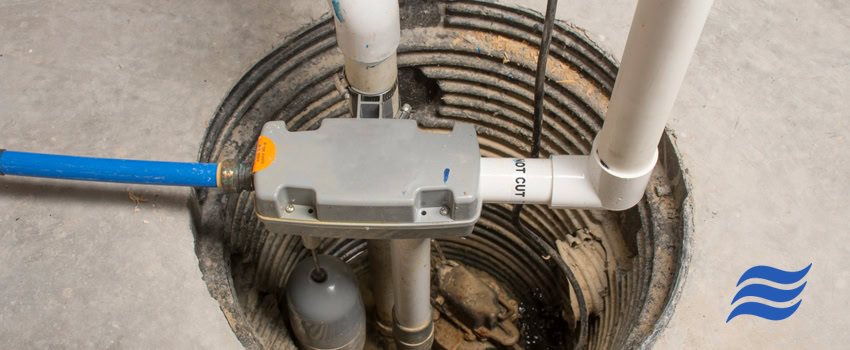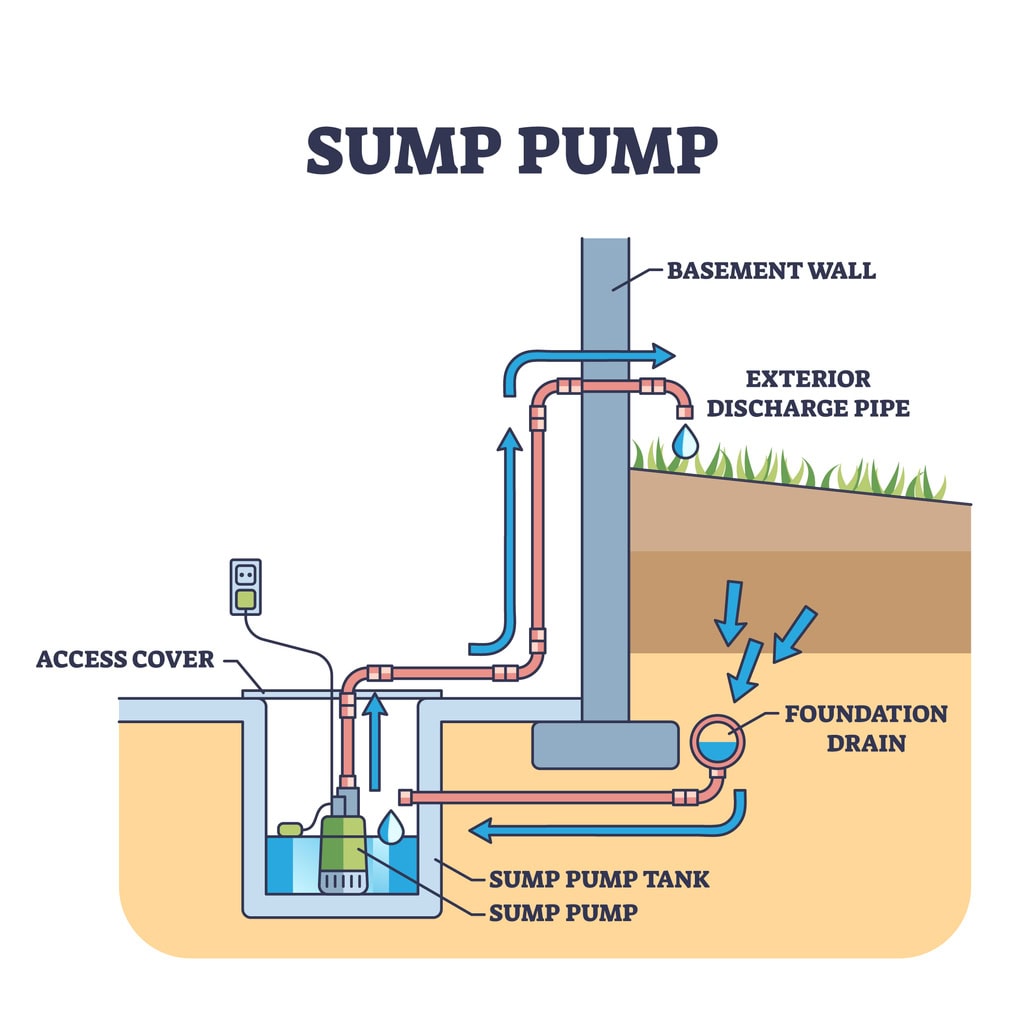
Everything Homeowners Need to Know About Sump Pumps
If you have a basement in Northern Virginia, your sump pump might be the hardest-working piece of equipment you never think about until it stops working. That's when you quickly realize just how much you need this unsung hero protecting your home from flooding.
The good news? Understanding how your sump pump works and what to watch for can help you avoid those middle-of-the-night panic moments when water starts pooling where it shouldn't. Let's explore everything you need to know about keeping your basement dry and your home protected.
What Is a Sump Pump & Why Do You Need One?
A sump pump is your home's first line of defense against basement flooding. Think of it as a specialized water removal system installed in a pit (called a sump basin) at the lowest point of your basement or crawl space. When groundwater seeps into this pit, the pump automatically kicks on and pushes that water away from your home's foundation to a safer drainage area outside.
In Virginia, sump pumps aren't just helpful. They're often essential. Our region experiences heavy spring rains, summer thunderstorms, and winter snow melts that can quickly overwhelm unprepared drainage systems. Without a functioning sump pump, all that water has nowhere to go except into your basement.

How Your Sump Pump Actually Works
The process is surprisingly straightforward. When groundwater seeps into your basement, it naturally flows to the lowest point where your sump pit is located. As water fills the pit, a float switch (similar to the one in your toilet tank) rises with the water level. When it reaches a certain height, it triggers the pump to turn on.
The pump then pushes water through a discharge pipe that leads outside your home, away from the foundation. Once the water level drops, the float switch lowers and the pump turns off until the next time water accumulates.
Most modern systems include a check valve on the discharge pipe that prevents water from flowing back into the pit after the pump shuts off. This keeps your pump from working harder than necessary and extends its lifespan.
Signs Your Home Needs a Sump Pump
Not every home needs a sump pump, but many properties do. Here are clear indicators that your home would benefit from one:
You Already Have Water Problems:
- Water pooling in your basement after heavy rain
- Damp spots or moisture on the basement walls
- Musty odors that won't go away despite cleaning
- Mold or mildew growth in basement areas
- Water stains on the basement floors or walls
Your Home's Location Makes You Vulnerable:
- Your house sits at the base of a hill where water naturally runs
- Your basement is below the water table
- Your neighborhood experiences frequent flooding
- Your property has poor natural drainage
- You live in an area with a high water table
Your Basement Layout Suggests Risk:
- You have a finished basement with valuable possessions
- Your basement houses essential equipment like your HVAC system or water heater
- You're planning to finish your basement and want protection first
If you're new to Northern Virginia, talk to your neighbors about their experiences. They can provide valuable insight into whether flooding is common in your area and whether most homes have sump pumps installed.
Types of Sump Pumps: Which One Is Right for You?
Choosing the right sump pump depends on your specific situation. Here are the main types and when each works best:
Pedestal Sump Pumps
The pump motor sits above the sump pit on a pedestal, with only the intake pipe extending into the water. These are the most affordable option and easiest to service since the motor is accessible.
Best for:
- Homes with narrow sump pits
- Situations where you want easy access for maintenance
- Tighter budgets
Keep in mind:
- They're noisier than submersible pumps
- The motor is more exposed to basement humidity
- They typically have a shorter lifespan than submersible models
Submersible Sump Pumps
The entire unit sits inside the sump pit and operates underwater. These are quieter and more powerful than pedestal pumps.
Best for:
- Homes with larger sump pits
- Situations where noise is a concern
- Areas with frequent or heavy water accumulation
Keep in mind:
- They cost more upfront than pedestal pumps
- Maintenance requires lifting the entire unit out of the pit
- They generally last longer and handle higher volumes
Battery Backup Sump Pumps
These systems keep working even when the power goes out, and that's often exactly when you need them most, since heavy storms that cause flooding also tend to knock out electricity.
Best for:
- Every home with a sump pump (seriously, this is essential)
- Areas with frequent power outages
- Finished basements with expensive equipment or furnishings
- Homes where owners travel frequently
Keep in mind:
- Batteries need regular testing and eventual replacement
- They add to the upfront cost but provide invaluable protection
- Some systems include water-powered backup pumps as an alternative
Combination Systems
Many homeowners opt for a primary pump with a battery backup system. This provides the best protection by ensuring continuous operation regardless of power status.
Choosing the Right Size & Power
Sump pump capacity is measured in gallons per hour (GPH) or gallons per minute (GPM). The right size depends on several factors:
For Typical Residential Needs:
- 1/3 HP pump handles most standard basement drainage
- 1/2 HP pump works well for larger basements or higher water volume
- 3/4 HP pump tackles severe water problems or commercial applications
Consider These Factors:
- Size of your basement or crawl space
- How quickly water accumulates during heavy rain
- Depth of your sump pit
- The height the water needs to be pumped (vertical lift)
- The distance the water travels to the discharge point
Warning Signs Your Sump Pump Needs Attention
Your sump pump will usually give you warning signs before it fails completely. Watch for these red flags:
Operational Issues:
- The pump cycles on and off frequently (called short cycling)
- It runs continuously without shutting off
- You hear loud clanking, grinding, or other unusual noises
- The motor struggles to start or makes humming sounds without running
Performance Problems:
- Water isn't being removed as quickly as it should
- You notice leaks around the pump or discharge pipe
- The pump seems to run longer than usual to remove water
- Water backs up even though the pump is running
Visual Clues:
- Visible rust or corrosion on the pump
- The pump vibrates excessively when running
- You see standing water in the pit even after the pump runs
If you notice any of these signs, don't wait for a complete failure during the next heavy storm. Addressing problems early prevents the extensive water damage that comes with a non-functioning pump.
Essential Maintenance to Keep Your Pump Running
Regular maintenance is the best way to ensure your sump pump works when you need it. Here's what you should do:
Every Three Months:
- Test your pump by pouring several buckets of water into the pit
- Watch to make sure the pump turns on quickly and removes water efficiently
- Listen for unusual noises during operation
- Check the discharge pipe to ensure water flows freely outside
Twice a Year:
- Clean debris from the sump pit
- Check the pump's intake screen for clogs
- Test your battery backup system if you have one
- Verify the check valve is working properly
Annually:
- Have a professional inspect your entire system
- Replace batteries in backup systems as recommended
- Consider having the pump serviced if it's more than 5 years old
Before Leaving Town:
- Test the system to ensure it's working properly
- Make sure backup batteries are fresh if you have a backup system
- Clear any debris from around the pump
Simple testing can prevent disasters. Pour water into your pit periodically and confirm the pump activates at the right water level, removes water quickly, and shuts off when the pit is empty.
When to Call Nichols & Phipps
While some sump pump maintenance can be DIY, certain situations require professional expertise:
Installation & Replacement:
- You need a sump pump installed in a home that doesn't have one
- Your current pump needs replacing
- You want to upgrade to a more powerful system
- You're adding a battery backup to your existing setup
Repair Situations:
- The pump won't turn on or runs constantly
- You hear grinding or unusual noises
- Water isn't draining despite the pump running
- Frequent cycling suggests a stuck float switch or other mechanical issue
- Electrical problems prevent the pump from operating
Preventative Service:
- Annual inspections to catch problems before they become emergencies
- Professional cleaning and maintenance
- System assessment to ensure your pump is adequate for your needs
Emergency Situations:
- Your basement is flooding, and the pump isn't working
- The pump failed during a storm
- You need immediate service to prevent water damage
The Nichols & Phipps Difference
When sump pump problems strike, you need a plumbing company that understands both the technical aspects and the urgency of protecting your home. At Nichols & Phipps, we've been helping Northern Virginia homeowners since 1972.
We don't just fix sump pumps. We help you understand your home's specific drainage challenges and recommend solutions that provide real protection. Whether you need routine maintenance, emergency repairs, or help choosing the right system for your home, our certified technicians bring the expertise and equipment needed to keep your basement dry.
When it's broken, we fix it. When it's unfixable, we replace it. When it's working, we keep it that way. No commissions, no gimmicks, just honest home repair help so you can get back to running your house and living your life.
Protect Your Home Before the Next Storm
Your sump pump works hard behind the scenes to protect your home from water damage. But it can only do its job if it's properly maintained and working when you need it.
Don't wait for a flooded basement to discover your pump isn't working. Whether you need installation, maintenance, or emergency repairs, Nichols & Phipps is here to help Northern Virginia homeowners keep their basements dry and their homes protected.
If you're experiencing sump pump problems, need professional maintenance, or want to ensure your system is ready for the next heavy rain, contact Nichols & Phipps today. Call us today at (703) 670-8519 or visit us online to schedule service.
